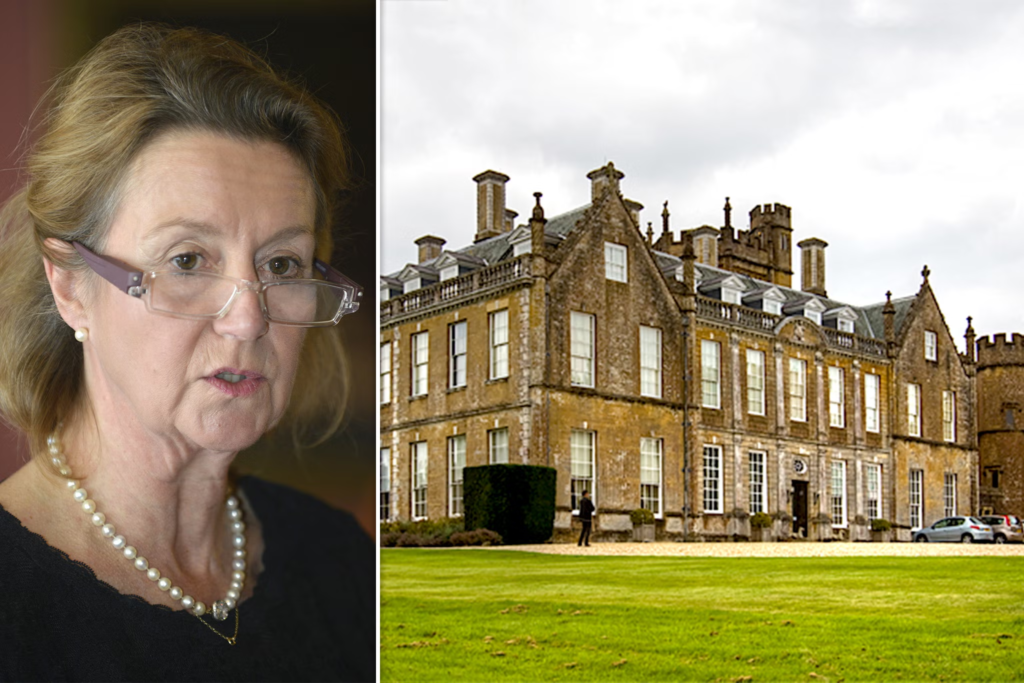The Ilchester Estate, owned by one of Britain’s wealthiest women, Charlotte Townshend, has been fined nearly £28,000 for exceeding its permitted water abstraction limits during a period of drought.
The estate, which spans over 15,000 acres in Dorset, was found to have taken more than 7,500 cubic metres of water beyond its licensed limit from the Dorset Frome, a rare and ecologically significant chalk stream.
The Environment Agency (EA) described this as a deliberate breach, despite previous warnings and guidance on how to apply for an increase in permitted abstraction levels.
The Estate and Its Water Usage Violation
Charlotte Townshend, with an estimated fortune of £489 million, inherited the estate from her mother and has maintained ownership of the expansive landholding, which includes houses, offices, gardens, and farms.
The estate holds a licence costing £120 per year to abstract water from a spring that feeds the Dorset Frome, a water source crucial to the local ecosystem. However, between December 2022 and July 2023, it exceeded its permitted usage, leading to an EA investigation and subsequent fine.
The estate was first advised in 2018 on the proper process to request an increase in water abstraction levels but instead continued to extract beyond the legal limit year after year.
This persistent violation occurred despite the estate being aware of the regulations and the environmental impact of over-abstraction, especially during a drought period. The estate’s actions prompted the EA to impose a financial penalty of £19,777.69, along with an additional £8,298.60 in costs.
Read : 3 Thai Women Fed Hormones and Treated Like Cattle at Human Egg Farm in Georgia
The significance of the Dorset Frome in this matter cannot be understated. It is one of only 200 chalk streams globally, with most located in the UK. These streams are highly sensitive ecological habitats, home to unique wildlife and reliant on stable water levels.
Read : Michael Jackson’s Children Blocked from Late Singer’s Trust Over ‘$700m Tax Bill’
The estate’s excessive water usage likely harmed the surrounding environment, contributing to the broader problem of chalk stream degradation, which is exacerbated by climate change and pollution.
Charlotte Townshend and the Ilchester Estate’s Legacy
Charlotte Townshend is an influential landowner with extensive holdings, including at least 20 acres of property in Holland Park, one of London’s most prestigious areas. She also owns and operates the historic Abbotsbury Swannery, the world’s only managed colony of nesting mute swans.
Her family’s ownership of the swannery dates back to 1543 when her ancestors purchased it from King Henry VIII. Notably, Townshend is the only person in the UK besides the King who is legally allowed to own swans.
Melbury House, a Grade I listed mansion, serves as her residence on the Ilchester Estate. The estate’s management has long been involved in conservation efforts, but the recent fine highlights concerns over its water usage practices.

Given the estate’s vast wealth and resources, critics argue that it could have taken more responsible measures to ensure compliance with water abstraction regulations rather than repeatedly exceeding its permitted levels.
A spokesperson for the estate acknowledged the violation and expressed regret over the breach. They stated that investments have since been made to upgrade the estate’s water infrastructure, reducing leaks and enabling daily monitoring of water abstraction.
These steps, they claim, reflect the estate’s commitment to environmental conservation and sustainable resource management. However, environmentalists remain skeptical, questioning why these measures were not implemented earlier, especially given the warnings issued years prior.
Environmental Impact and Regulatory Challenges
The over-extraction of water from the Dorset Frome is particularly concerning given the ecological vulnerability of chalk streams.
These waterways support a delicate balance of flora and fauna, including fish species such as brown trout and grayling, as well as aquatic invertebrates that rely on the pure, mineral-rich waters. Over-abstraction reduces water levels, disrupts habitats, and exacerbates the effects of droughts, making it more difficult for these ecosystems to recover.
The Environment Agency’s response underscores the importance of strict enforcement of water regulations, particularly during climate-induced dry periods. Senior Environment Officer Carolyn Lane emphasized that water abstraction licences are not optional guidelines but legally binding conditions designed to protect sensitive watercourses.
The agency’s actions in this case serve as a warning to other landowners and businesses that ignoring environmental regulations will have consequences.

Despite the fine and the estate’s reported efforts to rectify its water management practices, concerns persist over the broader issue of water governance in the UK.
Many argue that wealthier landowners can afford to pay fines without significantly altering their behavior, leading to repeated breaches of environmental laws. There are calls for more stringent penalties and oversight to ensure compliance and prevent further damage to the UK’s endangered chalk stream habitats.
The case of the Ilchester Estate exemplifies the ongoing tension between private landownership and environmental stewardship. While the estate has promised improvements, the damage done to the Dorset Frome remains a stark reminder of the need for greater accountability in water management.
As climate change intensifies and natural resources become increasingly scarce, ensuring sustainable water use will be more critical than ever to preserving the UK’s unique ecological landscapes.

